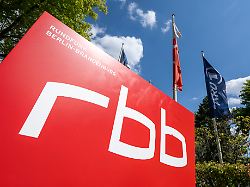processing of the Schlesinger affair
Report: RBB pays 1.4 million euros for legal advisors
01/17/2023 12:28 p.m
There is no peace at Rundfunk Berlin-Brandenburg. A report by the broadcaster itself now reveals that millions are being paid for advice from numerous law firms. The public prosecutor’s office would hardly act itself. Experts also express doubts as to whether all the evidence would really be presented.
According to a report by the broadcaster itself, the processing of the affair about grievances and faulty structures at Rundfunk Berlin-Brandenburg (RBB) has already triggered more than 1.4 million euros in legal fees. According to the report, 31 lawyers from four law firms are involved. The costs mentioned were billed for the months of July to November 2022 alone.
The largest contractor is the Lutz/Abel law firm, which alone billed more than one million euros for 20 lawyers. According to the RBB research, the lawyers meticulously accounted for the exchange with colleagues, but also with other law firms. The hourly rate is therefore 250 to 500 euros.
According to the report, several legal experts who looked at the bills called them “absurd and incomprehensible”. The Vice Dean and Head of the Faculty of Law at Humboldt University (HU), Martin Heger, said he could understand that the RBB would get legal advice on a case-by-case basis, for example from labor lawyers because of the controversial service contracts. But paying 31 lawyers is, in his view, a waste of radio broadcasts.
Expert sees hardly any income from the lawyers
Uwe Hellmann from the University of Potsdam sees that according to the report similarly: “I don’t think that the effort is in reasonable proportion to the return if you employ a whole army of lawyers for allegations that are rather manageable in the matter.” So far, the yield has actually been manageable. The interim report in October 2022 didn’t say much more than the press had previously read.
Legal experts also criticize the fact that the lawyers do double work and provide services for the Attorney General’s Office, for which the RBB is actually not responsible. Since August 2022, the Attorney General’s Office has been investigating former director Patricia Schlesinger and four other people. The public prosecutor’s office requested documents and evidence, and a criminal law firm settled the accounts: “Review, compilation and transfer of the documents”. They also charged for telephone conferences and meetings with the investigators. According to Heger, however, RBB would simply have to hand over the documents because the public prosecutor’s office wouldn’t demand anything illegal: “I don’t really see any reason why external legal advice should be obtained and of course paid for in order to process the lists submitted by the public prosecutor’s office.”
Work is done twice
But the invoices presented showed that not only the criminal law office, but also the other offices dealt with it. This also becomes clear in another case: Lutz/Abel repeatedly accounted for the “review of () requests for information from the public prosecutor’s office”. In August, for example, ten days should be about “correspondence […] to the Office of the Public Prosecutor for information, coordination and planning (of the) meeting with the Office of the Public Prosecutor”.
The beneficiaries of the work paid for by the RBB are not only the law firms, but also the general public prosecutor’s office, according to the report. According to RBB, experts like Hellmann have long noted the trend that public prosecutors simply rely on law firms. This becomes particularly critical if the law firms are paid by those who are being investigated – as in the case of the RBB. “The contributor pays the expenses for the lawyers, who ultimately take on a significant proportion of the work of the public prosecutor’s office, who collect material for the public prosecutor’s office, which would normally have to be collected by the public prosecutor’s office, which is paid for by the taxpayer,” says the HU professor heger.
There is a risk of deliberate selection of evidence
His colleague Hellmann explains: “If it has been discussed for many hours what information is passed on to the public prosecutor’s office, then in the end the result will have been that not all information has been passed on and then the public prosecutor’s office will not have received a complete picture. So in my opinion, the prosecutor’s office has to investigate itself.” Heger adds: “There is a risk that the pre-selection of the material by the lawyers will result in a certain list.”
It is part of the duty of investigators to get an overall picture, which is regulated by Article 160 of the Code of Criminal Procedure. And since the management level of the RBB was involved, the Attorney General’s Office should have confiscated on a large scale from the start, explains Heger. Otherwise there is a risk that the RBB will only release “appropriate” evidence or that evidence will be suppressed. According to Heger, the criminal offense of misappropriating contribution money might even have to be examined.
The Attorney General’s office in Berlin has meanwhile confirmed the cooperation with a law firm. Further “information will not be given due to ongoing investigations,” she writes at the request of the RBB.
